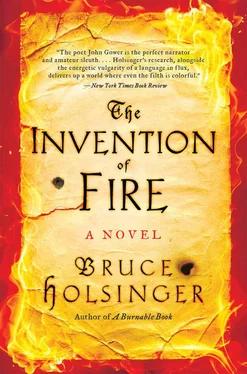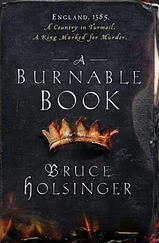Bruce Holsinger - The Invention of Fire
Здесь есть возможность читать онлайн «Bruce Holsinger - The Invention of Fire» — ознакомительный отрывок электронной книги совершенно бесплатно, а после прочтения отрывка купить полную версию. В некоторых случаях можно слушать аудио, скачать через торрент в формате fb2 и присутствует краткое содержание. Год выпуска: 2015, Издательство: HarperCollins, Жанр: Исторический детектив, на английском языке. Описание произведения, (предисловие) а так же отзывы посетителей доступны на портале библиотеки ЛибКат.
- Название:The Invention of Fire
- Автор:
- Издательство:HarperCollins
- Жанр:
- Год:2015
- ISBN:нет данных
- Рейтинг книги:3 / 5. Голосов: 1
-
Избранное:Добавить в избранное
- Отзывы:
-
Ваша оценка:
- 60
- 1
- 2
- 3
- 4
- 5
The Invention of Fire: краткое содержание, описание и аннотация
Предлагаем к чтению аннотацию, описание, краткое содержание или предисловие (зависит от того, что написал сам автор книги «The Invention of Fire»). Если вы не нашли необходимую информацию о книге — напишите в комментариях, мы постараемся отыскать её.
The Invention of Fire — читать онлайн ознакомительный отрывок
Ниже представлен текст книги, разбитый по страницам. Система сохранения места последней прочитанной страницы, позволяет с удобством читать онлайн бесплатно книгу «The Invention of Fire», без необходимости каждый раз заново искать на чём Вы остановились. Поставьте закладку, и сможете в любой момент перейти на страницу, на которой закончили чтение.
Интервал:
Закладка:
“If it would help.”
Baker folded his arms. “One could operate on your eyes, I suppose. Perhaps relieve some pressure on the engines, retard the further deterioration of your vision, whether for a month or a year we can’t know. Yet the risks are quite severe. I have watched hale and healthy men put their eyes under the blade for mere cataracts and emerge entirely blind. There are barbers in this very town who would be only too happy to take your coin and slit your eyes.” The barbers, those blood letters and tooth-drawers plying their rusty tools around the city’s hospitals and tenements. A barber, or so surgeons like Baker were fond of saying, would slice your throat to treat your toe.
“With no hope of a cure?”
“One does not cure encroaching blindness of this sort, not in my experience. Temporary relief at great risk is the best we can hope for.” He placed his hand again on my arm. “What you describe to me is a gradual process of deterioration, Master Gower. Gradual. There is no reason to think you will be entirely blind in six months, or even three years. You have two choices, as I see it.”
“And they are?”
“Stay on your present course and you will be a seeing man for as long as your vision lasts, and eventually a blind man. Or save yourself time by submitting to a painful, messy operation that will blind you now.”
A sentence devastating in its inevitability. “I understand,” I said, a little proud of myself for keeping my voice from hitching.
“However,” Baker said, his face brightening, “I can certainly help you in the shorter term with your reading and writing.”
“Oh?”
“Are you familiar with spectacles?”
“I have heard of them. A clerk I know at the Guildhall tells me that one of his former colleagues possessed such a device. You recommend them?”
Baker rose and went to a cabinet along the near wall. A drawer slid open, and he removed a tray that he brought over to me by the door. On the tray was an odd device that the surgeon held up for my inspection. Two circles of glass, each within a leaden teardrop, with the narrow ends of the oblong shapes hinged together in the middle. Baker lifted the device from the tray. Positioning the notch formed by the hinge over the bridge of my nose, he brought the glass toward my eyes. He took his manual off the bookstand and placed it in my lap.
“There now,” he said. “Here is a book of surgery purchased in Genoa. Give that a try.”
I am not a weeping man. Yet as I sat there in Thomas Baker’s peculiar chair I could feel the tears gathering in the corners of my eyes. They pooled beneath the odd lenses the surgeon had placed on my nose. I felt one trickle down, and before I could thumb it off, it dropped to the surface of the book. I wiped the parchment dry, felt the smooth flesh of the leaf.
For the first time in years I was able to see and read a line of writing with all the clarity I recalled from my earliest lessons in grammar. It was as if the page came newly alive before me, the script enlarged to span across my field of vision, the hand rendered in its full and worthy complexity: the flourishes reaching out from certain letters, the marks of punctuation in the Italian style, the liberties taken with uppercase vowels. I am sure now that there was nothing special about this hand, though in the moment I regarded the nameless scribe as a kind of god, capable of filling a folio with this ingenious invention of readable script.
This immediate sensation of miraculous clarity was short-lived. When I looked up-across the room, out the door, into Baker’s kind face-the world suddenly blurred.
I reached up to claw at my eyes. Baker grasped my forearms. “Simply remove the spectacles,” he said patiently.
I did, and focus returned, or at least the semblance of focus to which I was accustomed. My pulse slowed, and I breathed deeply.
“The spectacles are for reading, and only reading,” said Baker. “They will enlarge everything within two feet of your eyes. Beyond that they are less than worthless.”
The spectacles sat heavy in my hand. I fingered the frames, the clever hinge that joined the two lenses in the middle. “What sum for a set?”
He named a price, which I happily paid after selecting an additional pair from his collection and trying them out again on the manual. The apprentice had returned from his errand, and went about the room neatening up, placing the optical instruments in their proper order.
Baker led me to the door. It was nearly dusk, the coming evening settling on the city like a soft veil on an aging nun. We stood on the small covered landing outside, looking down on a neat courtyard formed by the grocer’s shop and three houses on each side of the square. He glanced at me kindly as I fingered the spectacle cases and slipped them into my inner cotte pocket.
“In some ways blindness could be a sign of God’s grace, you know,” he said. “It will save you from seeing things a man is not meant to see.”
I returned his look, thinking of the array of corpses in the St. Bart’s trench.
“Londoners have been killing Londoners since the Romans arrived, I suppose,” said the surgeon, looking out on the jumble of rooftops below Cornhill. “Yet the city has changed in the years since my first departure for Lombardy. It murders more brutally now.”
“And with new weapons.”
“Old ones as well. You have heard about this carter?” He half turned to me.
Something scratched at my memory.
“Stabbed,” Baker went on. “In the throat, the heart, the stomach, the back. Repeatedly and savagely, then dumped in the Walbrook.”
“Where?”
“Same spot as the others.”
“Who was he?”
“I did not hear the man’s name,” said Baker. “But he was a carter, that much I know. From the parish of St. Nicholas Acons, where my mother still resides. It was she who told me. A good man, his woman with a new child.”
St. Nicholas Acons, a parish in the ward of Langbourn, and for the second time that day I felt blinded as Piers Goodman’s words unfurled across my inner sight. And had a carter of Langbourn Ward up here-oh-last week? Weeping mess he was, too, with a sad sad sad sad story to tell about his cart and his cartloads. What’s in his cart and cartloads, Gower, hmm, what’s in his cart and all his cartloads?
My face had whitened. Baker noticed and reached for me, thinking me ill, though I shook off his comforting hand this time and turned for the stairs.
“What is it, Master Gower?”
I murmured something, waved the physician off, and descended among the Cornhill throngs to begin one of the longest walks of my life, through the mids of London and the turn for Cripplegate, feet not feeling my stride, as if I were floating above the pavers even while weighted with an impossible burden, my skin clammy and cold, chest tight with dread.
A lone sentry stood before the narrow walkway to the hermit’s cell. As I tried to ease past him he clutched my arm. “No passage here, sire.”
“I’m here to see the hermit.”
“What hermit is that, sire?” His cold look told me everything I needed but feared to know.
I straightened to my full height. “The hermit of St. Giles-along-the-Wall-by-Cripplegate.” There was a certain dignity in speaking Piers Goodman’s florid title for perhaps the last time. “The hermit who has blessed this sector of the London wall for as long as you have been alive.”
The soldier said nothing.
“I want to see his cell.” I fished a quarter noble from my purse. He looked at it, took a glance in either direction and then the coin. His head angled slightly toward the narrow walkway.
“Have your pleasure, sire. I’ve not got the key, but you’ll see all there is to see through the bars.”
Читать дальшеИнтервал:
Закладка:
Похожие книги на «The Invention of Fire»
Представляем Вашему вниманию похожие книги на «The Invention of Fire» списком для выбора. Мы отобрали схожую по названию и смыслу литературу в надежде предоставить читателям больше вариантов отыскать новые, интересные, ещё непрочитанные произведения.
Обсуждение, отзывы о книге «The Invention of Fire» и просто собственные мнения читателей. Оставьте ваши комментарии, напишите, что Вы думаете о произведении, его смысле или главных героях. Укажите что конкретно понравилось, а что нет, и почему Вы так считаете.












